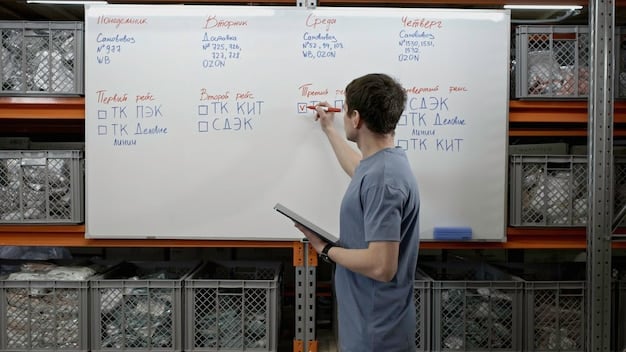Ace Your Exams: A US Student’s Guide to College Entrance Prep

How to prepare for college entrance exams involves strategic planning, consistent study habits, and utilizing resources like practice tests and tutoring to maximize your chances of success.
Navigating the world of college entrance exams can feel overwhelming, but with the right approach, students in the US can significantly improve their scores and increase their chances of getting into their dream schools. This guide will walk you through the essential steps on how to prepare for college entrance exams, from understanding the test formats to developing personalized study plans.
Exam Overview and Types of College Entrance Exams
Before diving into the preparation process, it’s crucial to understand the different types of college entrance exams available to US students. Each test has its own format, scoring system, and content focus. Knowing these differences is the first step in formulating an effective study plan tailored to your specific needs.
The main exams include the SAT and ACT, but there are often others such as the Accuplacer for placement tests. Here’s a breakdown:
SAT (Scholastic Assessment Test)
The SAT is a standardized test widely used for college admissions in the United States. It assesses skills in reading, writing and language, and math.
ACT (American College Testing)
The ACT is another standardized test that many colleges and universities use to make admissions decisions. The ACT covers four academic skill areas: English, mathematics, reading, and science.

- SAT: Focuses on reasoning and problem-solving skills.
- ACT: Emphasizes knowledge-based content and assesses subject mastery.
- PSAT/NMSQT: Serves as practice for the SAT and a qualifying test for the National Merit Scholarship Program.
Understanding the nuances of each test enables students to determine which exam aligns better with their strengths. For instance, students strong in science might prefer the ACT due to its science section. Alternatively, those who excel in logical reasoning might lean toward the SAT.
In conclusion, familiarizing yourself with the types and formats of college entrance exams is essential. This foundational knowledge will guide your study efforts and help you make informed decisions about which tests to take and how to prepare effectively.
Creating a Study Plan
A well-structured study plan is the backbone of effective exam preparation. Without a plan, it’s easy to get lost in the sea of information and resources. Creating a study plan helps you stay organized, manage your time effectively, and track your progress.
Here are some actionable steps:
Assess Your Strengths and Weaknesses
Before creating a study plan, it’s important to identify which areas you already excel in and which need improvement. This will guide your study efforts and allow you to focus on the areas where you need the most help.
Set Realistic Goals
Setting achievable goals ensures you stay motivated and on track. Break down your study plan into smaller, manageable chunks, setting deadlines for each milestone.

- Start Early: Begin your preparation well in advance to avoid cramming.
- Allocate Time: Dedicate specific hours each day or week to studying.
- Use Resources: Utilize a variety of study materials, including textbooks, practice tests, and online resources.
Creating a study plan involves understanding your strengths and weaknesses, setting realistic goals, and making a timeline. By following these guidelines, you’ll be well-prepared to conquer your college entrance exams.
Effective Study Techniques
Studying for college entrance exams isn’t just about putting in the hours; it’s about making those hours count. Effective study techniques can enhance retention, improve understanding, and boost your confidence. Incorporating a variety of methods into your study routine can help keep you engaged and prevent burnout.
Here are some techniques that you can use:
Active Recall
Instead of passively rereading notes, actively try to recall information without looking at your study materials. This helps strengthen memory and identify gaps in your knowledge.
Spaced Repetition
Review material at increasing intervals. This technique combats the forgetting curve and ensures long-term retention.
Practice Tests
Take full-length practice tests under timed conditions to simulate the actual exam experience. This helps you get familiar with the test format, pacing, and question types.
Effective study techniques involve actively engaging with the material, using spaced repetition to reinforce learning, and taking practice tests to simulate the exam environment. These strategies ensure that your study sessions are productive and impactful.
Utilizing Resources for Exam Preparation
Preparing for college entrance exams doesn’t have to be a solitary endeavor. There are numerous resources available to help students succeed, ranging from official test materials to tutoring services. Knowing how to leverage these resources can make a significant difference in your preparation journey.
Check the following options:
- Official Guides: The College Board (for SAT) and ACT, Inc. offer official study guides with practice tests and tips.
- Online Courses: Platforms like Khan Academy and Kaplan provide comprehensive online courses tailored to exam content.
- Tutoring Services: Personalized tutoring can offer targeted support and guidance in specific areas of weakness.
- Libraries and School Programs: Libraries offer free access to study materials, and many schools provide prep classes or workshops.
Khan Academy offers free SAT prep resources in partnership with the College Board, including practice tests, video lessons, and personalized study plans. Kaplan provides a range of services for both the SAT and ACT, including in-person classes, online courses, and one-on-one tutoring. Princeton Review also offers comprehensive prep programs with similar options.
Maximizing your exam preparation involves taking advantage of official guides, online courses, tutoring services, and school programs. These resources provide invaluable support, practice, and guidance to help you achieve your best score.
Test-Taking Strategies
Mastering the content of college entrance exams is just one piece of the puzzle. Equally important are the test-taking strategies that enable you to perform optimally under pressure. Knowing how to manage your time, approach different question types, and avoid common pitfalls can significantly improve your score.
Here are some strategies you can use:
Time Management
- Pace Yourself: Allocate a set amount of time for each section and stick to it.
- Don’t Dwell: If you’re stuck on a question, move on and come back to it later if time allows.
- Use Elimination: Eliminate obviously wrong answer choices to increase your odds of selecting the correct one.
Question Types
- Read Carefully: Understand what the question is asking before attempting to answer.
- Look for Clues: Use context clues in reading passages to infer the meanings of unfamiliar words.
- Check Your Work: If time permits, review your answers to catch any careless errors.
Effective test-taking strategies include managing your time effectively, understanding different question types, and staying calm under pressure. These techniques help you maximize your score and perform at your best on exam day.
Maintaining Well-being Throughout the Preparation Process
Preparing for college entrance exams can be a marathon, not a sprint. It’s essential to take care of your physical and mental health throughout the process to avoid burnout and maintain a positive mindset. Neglecting your well-being can not only impact your study effectiveness but also your overall performance on exam day.
Here are some tips:
- Get Enough Sleep: Aim for 7-8 hours of sleep each night to improve cognitive function and memory consolidation.
- Eat a Balanced Diet: Nourish your body with nutritious foods to fuel your brain and maintain energy levels.
- Stay Active: Incorporate regular exercise into your routine to reduce stress and boost mood.
- Take Breaks: Step away from your study materials periodically to relax and recharge.
Prioritizing self-care during exam preparation involves getting enough sleep, eating a balanced diet, staying active, and taking regular breaks. These practices help you maintain a healthy mind and body, enabling you to approach your studies with renewed focus and energy.
| Key Point | Brief Description |
|---|---|
| 📚 Exam Types | Understand the SAT, ACT, and PSAT formats. |
| 🗓️ Study Plan | Create a timeline with realistic goals and deadlines. |
| 🧠 Study Techniques | Use active recall and spaced repetition. |
| 🧘 Well-being | Prioritize sleep, diet, and exercise. |
Frequently Asked Questions
▼
Ideally, start preparing at the beginning of your junior year of high school. This gives you ample time to study, take practice tests, and address any weaknesses before the actual exams.
▼
Most students take the SAT or ACT twice. Taking it more than twice might not significantly improve your score; instead, focus on targeted preparation.
▼
Practice relaxation techniques, such as deep breathing exercises, to calm your nerves. Familiarize yourself with the test format to reduce anxiety about the unknown.
▼
Yes, both the SAT and ACT offer accommodations for students with documented disabilities. Contact the testing agencies well in advance to apply for accommodations.
▼
While many colleges are test-optional, entrance exams are still an important part of your application. They are used to assess your academic readiness and compare you with other students.
Conclusion
Preparing for college entrance exams is a significant undertaking, but with a combination of strategic planning, effective study techniques, and a focus on self-care, students in the US can approach these tests with confidence. By understanding the structure of the exams, creating a personalized study schedule, utilizing available resources, and mastering test-taking strategies, you can greatly improve your chances of success and open doors to your future academic endeavors. Remember, how to prepare for college entrance exams is not just about cramming information, but about developing the skills and mindset needed to excel.





